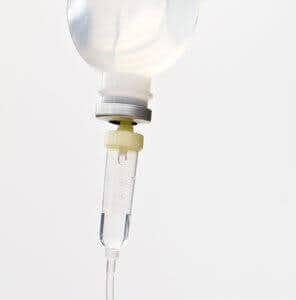
Q. How effective is chelation for reducing carotid plaque?
A. Chelation (pronounced key-lay-shen) is a way of removing toxic heavy metals such as lead, mercury, arsenic, iron, uranium or cadmium. The chelating agent EDTA (ethylene diamine tetra acetic acid) is used primarily for removing excess lead from the body. There is no controversy about its effectiveness and EDTA even has FDA approval for this application.
This compound was originally developed as a water softening agent in the 1930s. During World War II chemists were looking for antidotes to arsenic poisoning because this mineral was found in a chemical weapon called lewisite (the “Dew of Death”). It was later found to work especially well in ridding the body of lead. For example, when battery workers are exposed to dangerous amounts of lead due to occupational exposure, EDTA is infused intravenously to help chelate (grab on to) the mineral and remove it from the body through the urine.
The Cardiovascular Chelation Controversy
Decades ago, some physicians proposed that EDTA chelation might also help against atherosclerosis (the buildup of plaque in coronary arteries). The primary theory in those days was that EDTA grabbed onto calcium found in the plaque buildup of arteries and improved circulation to the heart muscle. We received many messages from people suffering from angina (chest pain) who claimed that EDTA infusions allowed them to resume normal activities without undergoing a coronary artery bypass graft (CABG) operation.
We were skeptical of these anecdotes, largely because mainstream medicine rejected this approach and cardiologists were especially critical. There weren’t any well-controlled clinical trials to prove or refute the claims, so we remained agnostics about the benefits of EDTA chelation for heart patients. Despite the lack of evidence of effectiveness, tens of thousands of patients signed up for an expensive series of treatments in the hope of easing symptoms or preventing more invasive treatment.
The Surprising Science Behind EDTA Chelation
Last year, the results of a randomized controlled study (TACT, or Trial to Assess Chelation Therapy) showed that EDTA chelation reduced the likelihood of a second heart attack, stroke or cardiac procedure to open clogged arteries in volunteers who had had a previous heart attack (JAMA, March 27, 2013).The benefits lasted over fiver years after the 40 EDTA chelation infusions were completed.
This was not what the cardiology community expected. Most experts anticipated that this “alternative” approach to heart disease would flame out in a placebo-controlled trial. Some expressed the attitude that they wouldn’t believe it even it were true. There were a great many complaints about this trial, even though it was funded by the federal government’s National Center for Complementary and Alternative Medicine (NCCAM) and followed standard controlled-trial procedures.
Further analysis of the TACT trial results concluded that post-heart attack patients with type 2 diabetes “demonstrated a marked reduction in cardiovascular events with EDTA chelation” (Circulation Cardiovascular Quality and Outcomes, Jan. 2014). Again, this is not what the cardiology community was expecting.
The most recent in-depth analysis of the Trial to Assess Chelation Therapy was even more definitive. The researchers found a high-dose vitamin/mineral regimen plus chelation significantly reduced the chance of heart attacks, strokes or cardiovascular hospitalizations in these patients compared with placebo (American Heart Journal, July, 2014). To read what the this team of investigators said specifically, here is their conclusion:
“In stable post-MI [heart attack] patients on evidence-based medical therapy, the combination of oral high-dose vitamins and chelation therapy compared with double placebo reduced clinically important cardiovascular events to an extent that was both statistically significant and of potential clinical relevance.”
“When Evidence Conflicts with Beliefs”
A comment published in the American Heart Journal (July, 2014) points out that:
“When evidence conflicts with expectations, the findings are typically discounted…we should not let our biases blind us to the possibility that unexpected results might provide an important clue for a new approach.
“It is critical to use the scientific method to test our beliefs against the evidence. Simply dismissing results that we did not expect would ignore opportunities to expand knowledge and the armamentarium of effective therapies.”
To that we say amen! We agree with the these Stanford physicians that more research is called for and that the cardiology community should remain open to the possibility that EDTA chelation might indeed benefit selected heart patients. If further research confirms the benefits of EDTA, insurance companies should pay for treatment.
We welcome your comments about EDTA. If you have had this form of treatment, what was your experience. If you are a health professional, what do you make of the research. Share your thoughts below.

